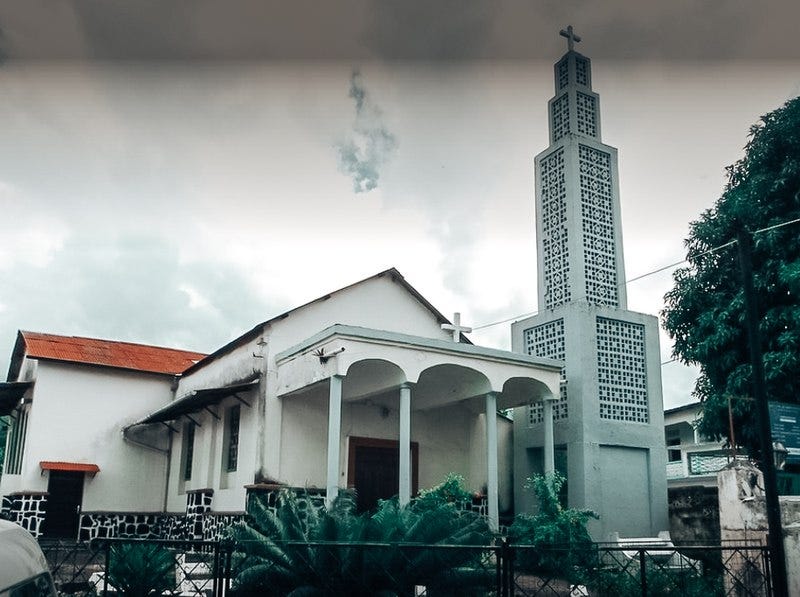🔅 The Unseen Killer of East African Staple Foods
Fally Ipupa: The musician trying not to let politics ruin his gigs, Ethnic cleansing in Darfur, The floods wreaking havoc in East Africa, And much more...
Photo of the day
Catholic Church, Comoros
Markets:
🟢 Nigerian SE: 70,613.60 (+0.19%)
🟢 Johannesburg SE: 72,465.63 (+0.23%)
🟢 Ghana SE: 3,134.89 (+0.37)
🟢 Nairobi SE: 86.41 (+1.02%)
🔴 US S&P 500: 4,368.57 (-0.22%)
🔴 Shanghai Composite: 3,052.37 (-0.16%)
Kenya Gets a $650 Million Boost from IMF | Kenya is getting a little extra help from the International Monetary Fund. The country’s lending program with the IMF has been increased by $650 million, which will come in handy when it’s time to refinance a $2 billion Eurobond next June. This is great news for Kenya, where the foreign exchange rate has been struggling and causing some concern for investors. However, critics blame the IMF for the current cost of living crisis and sky-high taxes, although the government's economic adviser had this to say: “Without the IMF program, we’d probably default.”
*Data accurate as of the close of markets across the continent
Brief & Bright: Africa's Top Five
Aflatoxins: The Unseen Killer of East African Staple Foods
Aflatoxins are sneaky little toxins produced by fungi that love to hang out on crops like maize, peanuts, and cottonseed. They're not good for you. In fact, they can take up to 15 years to cause serious health issues like liver cancer. And get this: they're tasteless and odourless, so you can't even tell when you're eating them. Talk about a silent but deadly enemy. But it's not just humans who are at risk—animals can get sick from aflatoxin, too. So what's being done about it? Well, experts are trying to raise awareness and encourage farmers to use bio-control methods to reduce contamination. But it's a tough battle, especially with the effects of climate change making the problem worse. Plus, many farmers don't even know about aflatoxins, like Eliamani Singo, who's been farming for 20 years and had no idea about the danger lurking in his maize.
Fally Ipupa: The Musician Trying Not To Let Politics Ruin His Gigs
Fally Ipupa is a big deal in the Democratic Republic of Congo. His songs have millions of views on YouTube, and his live performances attract thousands of fans. But sometimes, his concerts get a little wild. Like that one time in Paris when protesters set fire to scooters and bins outside the venue. Why? Because some think Congolese musicians shouldn’t be cozying up so much with politicians back home and should speak out against issues facing the country. But Fally says he just wants to make music. He's bringing his first show to London, and although he wants to move past politics and points out the fact that Congolese music is losing its global place to music from other countries (read Afrobeats and Dancehall), the concert will be held while elections are happening back home. How will the fans react?
Floods Wreak Havoc in East Africa
It’s a double whammy for East Africa—first, the worst drought in 40 years, and now, the worst flooding in years. Over 300,000 people have been forced to flee their homes in Somalia alone, and the death toll announced on Wednesday from a deluge currently stands at 29. People are stranded, shops are washed away, and roads are cut off in Kenya and Uganda as well. The culprit? Two weather phenomena are called El Niño and the Indian Ocean Dipole. Climate change seems like a likely culprit, too, and African leaders are proposing new taxes and financial reforms to deal with the consequences. The managing director of the Somali Disaster Management Agency put it this way: "What is going on today is the worst for decades."
Darfur Crisis
The Sudanese region of Darfur is facing a fresh wave of violence, and people are fleeing. Witnesses are pointing fingers at the paramilitary Rapid Support Forces (RSF) for allegedly carrying out ethnic killings against non-Arabs. But the RSF denies any involvement, saying it’s just a "tribal conflict." Seven thousand refugees have crossed the border into Chad, 27km away from West Darfur's capital, Al-Geneina, in just three days. Many of them are wounded, and the UN says there’s an "unimaginable" humanitarian crisis going on. Sudan's conflict between the RSF and the Army has seen over six million people displaced. At recent talks in Jeddah, the warring parties agreed to facilitate aid deliveries and confidence-building measures, but efforts to secure a ceasefire have so far failed.
Namibia’s New Iron Plant: The Future of Green Steel

Namibia is making history by building Africa’s first decarbonised iron plant, powered entirely by green hydrogen. This is a big deal because the steel industry is one of the biggest polluters in the world. This plant, called Oshivela, will produce 15,000 tonnes of iron per year with zero carbon emissions. And it’s not just for show—the plant will eventually ramp up production to a whopping 1 million metric tons of green iron annually. This is all thanks to a consortium of German and Namibian companies and a cool new technology called HyIron, which uses green hydrogen to process iron ore in a rotary kiln.
Food for Thought
"A wise man who knows the proverbs of the land reconciles difficulties."
— Ashanti Proverb







